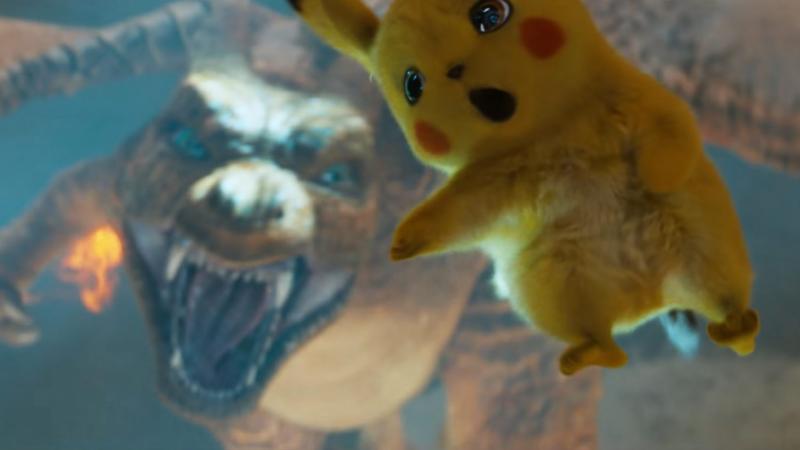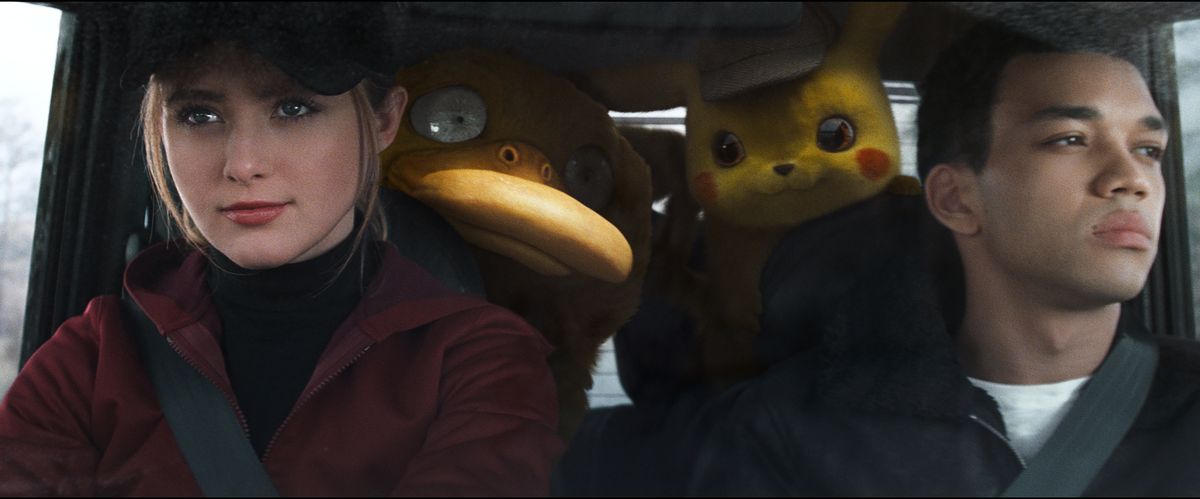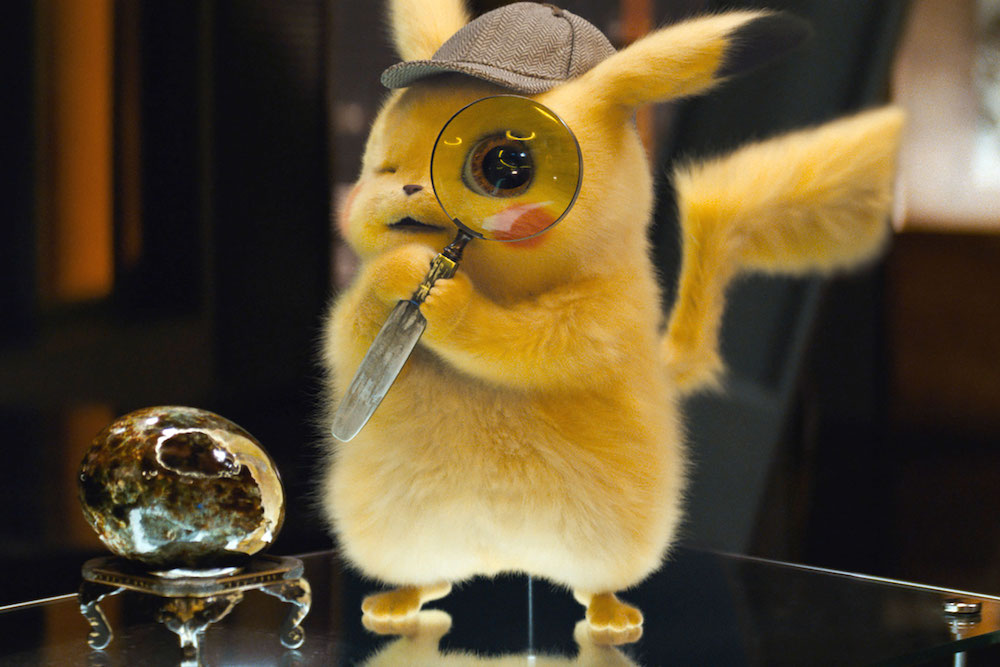Pokémon Detective Pikachu review - a cute commercial | reviews, news & interviews
Pokémon Detective Pikachu review - a cute commercial
Pokémon Detective Pikachu review - a cute commercial
Pokémon meets the relatively real world, and hits its limits

This is the Who Framed Roger Rabbit? of the Pokémon franchise, bringing the video game’s cute critters into a live-action,
Tim had father issues even before his legendary police detective dad careened off the road, in a prologue at the Pokémon Genetic Research Facility with the shadowy feel of a Seventies conspiracy thriller. Interrupted at a Pokémon hunt (slightly less brutal than it sounds) by news of the death, Tim travels to Ryme City, where world cultures intermingle as casually as people and Pokémon, yellow New York cabs jostling with red London buses. The city remains as essentially Japanese as the cameoing Ken Watanabe, and Pokémon itself.
 The film lacks any of Roger Rabbit’s human-animation, inter-reality frisson. It takes place in a golden, soft-focus glow reminiscent of Spielberg in the 1980s, minus the magic; the comforting opposite of the noirs and conspiracy flicks it references. Smith and Newton have innocent charm as the young leads, in a resolutely pure kids’ film. Ryan Reynolds’ wiseacre chatter as he voices the Pokémon gumshoe stays high-voiced and harmless, diluting his Deadpool persona for juvenile consumption. Knowing references to sex and drugs are minor and mild, not relentlessly aimed over children’s heads at paying adults.
The film lacks any of Roger Rabbit’s human-animation, inter-reality frisson. It takes place in a golden, soft-focus glow reminiscent of Spielberg in the 1980s, minus the magic; the comforting opposite of the noirs and conspiracy flicks it references. Smith and Newton have innocent charm as the young leads, in a resolutely pure kids’ film. Ryan Reynolds’ wiseacre chatter as he voices the Pokémon gumshoe stays high-voiced and harmless, diluting his Deadpool persona for juvenile consumption. Knowing references to sex and drugs are minor and mild, not relentlessly aimed over children’s heads at paying adults.
Then again, the nostalgic twenty- and thirtysomethings who fell in love with Pokémon in the Nineties, and the more recent addicts who walked the streets enslaved by Pokémon Go, are Pikachu’s real audience, just as happy in this bright, soft-edged play-world as current children entranced by the creatures’ cuteness.
 Those adults hard-wired by thousands of hours capering with Pokémon were in transports of delight at the screening I attended, suggesting this migration as close to the real world as the critters can get may revive this sputtering film franchise. But as the Pokémon battles become interminable, there’s no depth here for outsiders. Among the fantasy behemoths which have consumed cinema-going, only Marvel had the patience, and almost bottomless raw material, to build an emotionally affecting mythology. The behavioural data harvested by Pokémon Go is this likeable film’s secret soul.
Those adults hard-wired by thousands of hours capering with Pokémon were in transports of delight at the screening I attended, suggesting this migration as close to the real world as the critters can get may revive this sputtering film franchise. But as the Pokémon battles become interminable, there’s no depth here for outsiders. Among the fantasy behemoths which have consumed cinema-going, only Marvel had the patience, and almost bottomless raw material, to build an emotionally affecting mythology. The behavioural data harvested by Pokémon Go is this likeable film’s secret soul.
There are two moments of captivating imagination. Pikachu’s interrogation of a Pokémon who communicates only in mime is almost worthy of the Marx Brothers. The sudden, sliding collapse of a whole hillside, and its reconfiguring as a row of giant turtles, has the vertiginous effect of Christopher Nolan’s Inception. Pikachu’s hologram flashbacks to imperishable, buried memories have also strayed in from some phantom, Philip K. Dick-scripted Pokémon film. Then it goes back to subliminally selling you games, and it all seems a bit offensive.
The future of Arts Journalism
You can stop theartsdesk.com closing!
We urgently need financing to survive. Our fundraising drive has thus far raised £49,000 but we need to reach £100,000 or we will be forced to close. Please contribute here: https://gofund.me/c3f6033d
And if you can forward this information to anyone who might assist, we’d be grateful.

Subscribe to theartsdesk.com
Thank you for continuing to read our work on theartsdesk.com. For unlimited access to every article in its entirety, including our archive of more than 15,000 pieces, we're asking for £5 per month or £40 per year. We feel it's a very good deal, and hope you do too.
To take a subscription now simply click here.
And if you're looking for that extra gift for a friend or family member, why not treat them to a theartsdesk.com gift subscription?
more Film
 Frankenstein review - the Prometheus of the charnel house
Guillermo del Toro is fitfully inspired, but often lost in long-held ambitions
Frankenstein review - the Prometheus of the charnel house
Guillermo del Toro is fitfully inspired, but often lost in long-held ambitions
 London Film Festival 2025 - a Korean masterclass in black comedy and a Camus classic effectively realised
New films from Park Chan-wook, Gianfranco Rosi, François Ozon, Ildikó Enyedi and more
London Film Festival 2025 - a Korean masterclass in black comedy and a Camus classic effectively realised
New films from Park Chan-wook, Gianfranco Rosi, François Ozon, Ildikó Enyedi and more
 After the Hunt review - muddled #MeToo provocation
Julia Roberts excels despite misfiring drama
After the Hunt review - muddled #MeToo provocation
Julia Roberts excels despite misfiring drama
 Ballad of a Small Player review - Colin Farrell's all in as a gambler down on his luck
Conclave director Edward Berger swaps the Vatican for Asia's sin city
Ballad of a Small Player review - Colin Farrell's all in as a gambler down on his luck
Conclave director Edward Berger swaps the Vatican for Asia's sin city
 London Film Festival 2025 - Bradley Cooper channels John Bishop, the Boss goes to Nebraska, and a French pandemic
... not to mention Kristen Stewart's directing debut and a punchy prison drama
London Film Festival 2025 - Bradley Cooper channels John Bishop, the Boss goes to Nebraska, and a French pandemic
... not to mention Kristen Stewart's directing debut and a punchy prison drama
 London Film Festival 2025 - from paranoia in Brazil and Iran, to light relief in New York and Tuscany
'Jay Kelly' disappoints, 'It Was Just an Accident' doesn't
London Film Festival 2025 - from paranoia in Brazil and Iran, to light relief in New York and Tuscany
'Jay Kelly' disappoints, 'It Was Just an Accident' doesn't
 Iron Ladies review - working-class heroines of the Miners' Strike
Documentary salutes the staunch women who fought Thatcher's pit closures
Iron Ladies review - working-class heroines of the Miners' Strike
Documentary salutes the staunch women who fought Thatcher's pit closures
 Blu-ray: The Man in the White Suit
Ealing Studios' prescient black comedy, as sharp as ever
Blu-ray: The Man in the White Suit
Ealing Studios' prescient black comedy, as sharp as ever
 The Woman in Cabin 10 review - Scandi noir meets Agatha Christie on a superyacht
Reason goes overboard on a seagoing mystery thriller
The Woman in Cabin 10 review - Scandi noir meets Agatha Christie on a superyacht
Reason goes overboard on a seagoing mystery thriller
 London Film Festival 2025 - crime, punishment, pop stars and shrinks
Daniel Craig investigates, Jodie Foster speaks French and Colin Farrell has a gambling habit
London Film Festival 2025 - crime, punishment, pop stars and shrinks
Daniel Craig investigates, Jodie Foster speaks French and Colin Farrell has a gambling habit
 I Swear review - taking stock of Tourette's
A sharp and moving tale of cuss-words and tics
I Swear review - taking stock of Tourette's
A sharp and moving tale of cuss-words and tics

Add comment